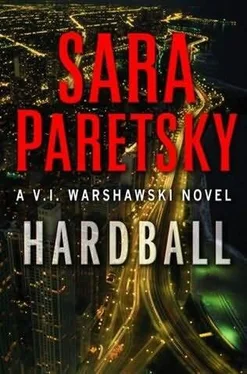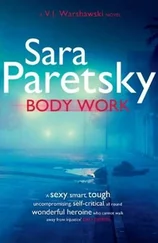She glared at me. “I’d strongly advise you not to suggest to a nun that she take a bolt cutter to a room that’s been secured by the police.”
I smiled at her. We were playing a game where the person who keeps her temper longest wins. “You know, we live in a county where patronage workers get paid a hundred thousand dollars a year not to work. So it cheers me no end to see that you really are earning the salary my tax dollars pay for. You’ve been hard at it, and I’ll see you get a note stuck in your personnel file.”
LINE SPINNERS
EVEN THOUGH I’D WALKED AWAY TRIUMPHANT FROM THAT skirmish, there was no way I could win a larger battle with the law. The real question, if I could get my tired brain to return to duty, was why they cared so much. Their questions, their whole attitude, seemed more about Sister Frances’s and my conversation than her murder.
I had to be honest enough to admit my arrival at the murder scene two days later warranted investigation. But why did they have such an elaborate stakeout on the building in the first place?
The interrogation had worn me out. I tried to make some notes, in big block capitals with a felt-tipped marker, but the effort put me to sleep. When I woke, it was because the doorman was calling on the house phone: Sister Carolyn Zabinska had arrived.
“You don’t look well. Are you up to talking?” she greeted me.
Her own face was pinched and gray with grief. She was tall and sturdily built, but her shoulders were bent forward with pain.
“It’s just my hair,” I said, steering myself away from self-pity. “I tried to trim it with sewing shears and was singularly inept. The FBI was ruder. They said I looked like the losing end of a catfight.”
“Yes, the FBI. That’s what I want to talk about… One of the things, anyway.”
She followed me onto the balcony off the living room, where Lotty has a little table and chairs in the summer. I offered refreshments, and left her standing there, looking out over Lake Michigan, while I burrowed in Lotty’s kitchen. She practically survives on Viennese coffee, but I found some German herbal infusions in the back of a drawer. When I returned to the balcony with a tray, precariously balanced between my bandaged palms, Sister Carolyn sat down and asked how I knew the FBI was watching the Freedom Center building.
“I don’t know if the FBI is involved. Homeland Security took the pictures.” I explained what I’d learned from today’s interview, including the news that the feds photographed everyone entering and leaving.
“That’s so outrageous. Why on earth?”
“I don’t know. When they questioned me in the hospital, they were dancing like rhinos around the subject. They implied it could be because of your tenants. You’re the one who knows if you’re treading on their toes.”
“Treading on their toes? It’s true we protest at the School of the Americas. We work with poor immigrants, with refugees, with people on death row. We’re involved in affordable housing. And peace. But we don’t do anything clandestine or immoral. We don’t sell drugs or weapons or spy on people.”
“You know darned well you’re rocking the whole aircraft carrier with those issues. America as armed camp is the status quo. Peace, letting in immigrants, ending torture, ending the death penalty: no wonder they think you’re a threat. There must be a whole floor of that building on the Potomac dedicated to your Freedom Center.”
“But that means we’re endangering the other tenants,” Zabinska said, worried. “We don’t own the building, but the management company that does has been pretty generous. They let us run the Freedom Center out of the ground-floor apartments. Five of us sisters attached to the center rent there, and we’ve ended up working with a lot of the other tenants because so many are either refugees or are trying to figure out how to get health care or housing vouchers. Maybe we should see about moving the ones who’re most at risk for deportation. Everyone’s pretty scared as it is because of the fire bombs.”
“You’d better be very careful where and how you talk about it,” I warned her. “They probably are listening to all your conversations, not just your phones.”
She was outraged, of course, especially when I explained how hard it is to detect or block a sophisticated eavesdropper, which the feds certainly are. We talked over her options. Technological solutions were outside her budget, and playing cloak-and-dagger, with codes and meetings off premises, was too time-consuming.
“Besides, that kind of secretiveness would drive us mad. It’s so counter to our vows and our mission. But maybe we should start leaving through the alley when we want to be private.”
I made a face. “It would be easy to mount tiny surveillance cameras on the light poles in the alley. It depends on how much they care about you.”
Sister Carolyn pushed the heels of her hands against her eyes. “I know these are important matters, but it’s hard to pay attention to them right now. We’re all still in shock at losing Frankie. The violence of the attack, that’s very hard to absorb. But losing her… I wasn’t ready for that. I’m the head of the Freedom Center, but she was our real leader, spiritually, psychologically, in all the ways that count most. I need to understand why she was killed.”
I bit my lower lip. “I wish I knew, but I don’t.”
“When I looked in your wallet and saw your PI license, I thought maybe you’d come to spy on her. I didn’t realize then that the government was already spying on us. I thought maybe an anti-immigrant group had hired you.”
I went through my tired story about hunting for Lamont Gadsden and Steve Sawyer. When I mentioned Karen Lennon’s name, Sister Carolyn’s heavy expression lightened for a moment.
“Karen… Of course I know her. She’s on our Death Penalty committee, and we’ve done some work together on affordable health care. How did she find you?”
“By chance. She was in a hospital ER when I came in with a homeless man who’d collapsed on my sidewalk.”
“And Dr. Herschel-this is her apartment, I realized-I was surprised to learn you were staying with her.”
I’ve known Lotty half my life now, ever since I was an undergraduate and she was advising an abortion underground. Sister Carolyn took that in without blinking. Some of her immigrant clients got medical care at Lotty’s storefront clinic, and Lotty had saved the life of one of their pregnant women when she was shot in the abdomen. It clearly made me a better citizen in Zabinska’s eyes that Lotty was my friend and that I was working with Karen Lennon.
I finally brought the conversation back to my own inquiry. “Did Sister Frances ever talk about Steve Sawyer’s trial or the march in Marquette Park where Harmony Newsome died?”
“I was a child when that happened, a middle schooler at Justin Martyr. Frankie came to speak to us as part of the cardinal’s outreach program. A lot of the children booed and called her names, but she made me see the world in a different way. I came to my vocation because of Frankie.”
She shook her head, trying to shake tears away. “She wouldn’t have talked to me about the murder at the time because I was a child. And by the time I went through my novitiate, and ended up back in Chicago with her, it was twelve years later. So many other things started happening that we needed to tackle-the School of the Americas and the Guatemalan asylum seekers, and then the loss of jobs and health care-that we didn’t dwell much on that past. Did she think this Steve Sawyer was wrongly convicted?”
“He may have been. All I can say, with any certainty, is that he was very badly represented in a trial that was a travesty, at least as far as I can tell from the transcript. Sister Frances said she wanted to testify at the trial but the defense wouldn’t call her.”
Читать дальше












